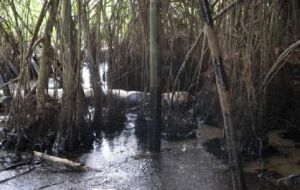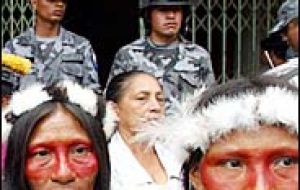MercoPress. South Atlantic News Agency
Ecuador leader sides with Indians against oil giant
 Oil split on the jungle
Oil split on the jungle Ecuadorean President Rafael Correa went deep into the Amazon jungle to show his disdain for Chevron Corp., which is on trial in Ecuador for allegedly failing to clean up billions of gallons of toxic wastewater.
"Soil with oil, friends," Correa said, lifting a fistful of greasy dirt from a small farm in the rain forest where Texaco Petroleum Co. spent three decades extracting oil before it merged with Chevron in 2001. Correa, a U.S.-trained economist in power since January, is the first Ecuadorean president to support the estimated 30,000 Amazon Indians and settlers who are suing the U.S. oil giant. The leftist leader accused the company of causing 30 times more damage than the 11-million gallon Exxon Valdez spill off the Alaskan coast in 1989. "But it would seem that what happens in the Third World doesn't matter," Correa said. Farmers say the oily muck keeps them from cultivating their land and has caused stomach and skin ailments among the area's residents. The plaintiffs are seeking $6 billion in damages, alleging that Texaco dumped more than 18 billion gallons of oily wastewater into the verdant rain forest and failed to clean it up properly. The Indians' attorneys have presented studies showing elevated cancer rates in the area. San Ramon, California-based Chevron says there is no proof oil contamination caused the cancers. It also says that Texaco, which ended its operations in 1992, followed Ecuadorean environmental laws in a $40 million cleanup that began in 1995. Just three years later, Ecuador's government certified the cleanup as complete. Correa called that a "fraud for the country." "There was no cleanup here," he said -- the damage was simply covered up with dirt dumped over contaminated soil and wastewater ponds. The Indians tried for a decade to have their case heard in U.S. federal court before shifting their battle to a makeshift courtroom in the ramshackle jungle town of Lago Agrio, which means "sour lake," where an Ecuadorean judge is hearing evidence. Pablo Fajardo, a former farmer who became the plaintiffs' lead attorney, said they welcome Correa's support for the suffering people but aren't looking for him to intervene in the judicial process. A Chevron attorney, Rodrigo Perez, told The Associated Press he is "sorry the president has taken sides." "The trial must continue according to the evidence," Perez said, "based on the proceedings, not on statements by the executive branch or the press." Chevron, which said it won't settle the case out of court, also expressed concern that political pressure might threaten its chances for an impartial trial in Ecuador. The judge's decision isn't expected until at least next year, and an appeals process could take another three years. The trouble in Ecuador hasn't harmed Chevron's bottom line. Chevron has earned $45 billion during the past three years, its profit growing progressively higher each year





Top Comments
Disclaimer & comment rulesCommenting for this story is now closed.
If you have a Facebook account, become a fan and comment on our Facebook Page!